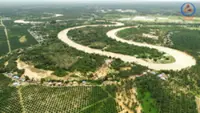KOTA KINABALU: The Plantation and Commodities Ministry is committed to addressing the growing conflict between elephants and humans, particularly in oil palm plantations across Sabah.
Deputy Minister Datuk Chan Foong Hin said the government has set up the Malaysian Palm Oil Green Conservation Foundation (MPOGCF) under the ministry to tackle such conflicts involving elephants and other wildlife, including orang utan.
Follow us on our official WhatsApp channel for breaking news alerts and key updates!
Thank you for your report!





